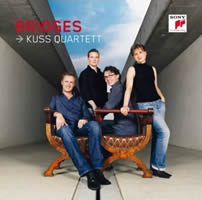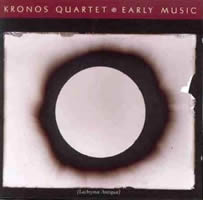Dowland Our Contemporary: String Quartets
|
Walt Mundkowsky [March 2009.]
“Bridges.” Orlando di LASSO: Prophetiae Sibyllarum (exc.) (1550s). György KURTÁG: Officium breve in memoriam Andreae Szervánsky, op. 28 (1988-9). Igor STRAVINSKY: Trois pièces pour quatuor à cordes (1914). Thomas ADÈS: Arcadiana (1994). John BENNET: Weep, oh mine eyes (1599). John DOWLAND: If my complaints (1597). Kuss Quartett: Jana Kuss, Oliver Wille (vlns), William Coleman (vla), Felix Nickel (vc). Sony BMG 88697092162 import (http://www.sonybmg.de/). With detours, these days I go straight from the 1620s (deaths of Byrd, Gibbons, Dowland and Bull) to the modern era; so this CD, which takes the same route, doesn’t feel odd. Components Lasso wrote Prophetiae Sibyllarum in his twenties. The wrenching chromatism portrays the Sibylls’ strange utterances indelibly, but its style won no followers until Gesualdo. A Prolog opens C major – G major – B major – C-sharp minor – E major – F-sharp minor — a chord progression rarely encountered. The Kuss’ acute tuning naturally aces that of any vocal group; less expected is how their tonal blend and fluctuating line can imitate a band of singers. Three out of 12 motets (carmina chromatico) are employed, framing the more recent music. (Amusingly, this is easily the most “advanced” stuff on the disc.) Officium breve is what its title says, a pocket requiem for Kurtág’s composer friend (with 15 sections taking just 13:13). Austerity is tempered by deep personal involvement. Bach, Webern canons and Szervánsky’s Serenade for Strings protrude, conversing with shards of previous Kurtág scores. The Kuss studied with the composer, though their view differs from the Keller’s (ECM New Series 1598). Each episode gets a specific cast, from fierce quasi giusto to moving Larghetto, truncated. (The Keller deviates less often.) Coming on the heels of Le Sacre, Stravinsky’s modest Trois pièces vexed many. His first chamber piece uses a string-quartet setup but isn’t one. A Russian folk melody (invented? recalled?) opens, then the spastic, up-and-down gait of a popular clown. The last goes not at all with the first two, a liturgical item whose stasis-in-motion would drive Symphonies of Wind Instruments (1920). The Alban Berg’s high-pressure intensity and snap (in 1983 for EMI) remain unique; less inhuman, the Kuss is broader but sharp, clarifying organum procedures in the finale. Adès’ Arcadiana is a seven-part suite loosely organized around desires for paradise. Lots of quartets play it, and the Kuss should rank high — many-hued yet subtle. Their rocking sensation animates Venezia notturna, and L’Embarquement offers Adès a rationale for flying his Couperin flag. I admire the Kuss for not making a dog’s dinner out of the Elgar tribute, O Albion. The finest writing (i.e., least showy) comes last. River of forgetfulness in Hades, Lethe caps the earlier water imagery and halts on a suitably damp note. Groups rarely leave it as surprising as here. (Delete the H from Hades, and you have Adès.) Arcadiana leads right into the close: from an Albion imagined to Elizabethan songs. John Bennet’s madrigal inspires playing fluent enough to cinch the “For Voices or Violls” one sees in the era’s scores. Blend, bow pressure and things like “Drag” have been addressed. Dowland’s If my complaints is always nearby. As a “goodnight,” the solace it affords the quartet (and us) is undeniable. (The viol-consort recasting, Captaine Piper his Galiard, is in Lachrimae 1604.) String-quartet programs often disappoint. With pithy notes and pellucid sound, “Bridges” deserves some love (and spins). Amy Lowell’s poem upon hearing the Stravinsky in concert is here.
“Early Music.” Guillaume de MACHAUT: Kyrie I-III* (early 1360s). Christopher TYE: In Nomine “Rachells Weepinge” (16th cent.); In Nomine “Farwell My Good 1. Forever” (16th cent.). David LAMB: Långdans efter Byfåns Mats** (1997). John DOWLAND: Lachrymae Antiquae† (1604). Arvo PÄRT: Psalom (1991-3). Harry PARTCH: Two Studies on Ancient Greek Scales (1946). Jack BODY: Long-Ge (1987). John CAGE: Totem Ancestor for Prepared Piano (1943); Quodlibet (1950). TRAD.: Brudmarsch frå Östa††. KASSIA: Using the Apostate Tyrant As His Tool (9th cent.). Louis “Moondog” HARDIN: Synchrony No. 2‡ (1994). PÉROTIN: Viderunt omnes (c. 1200). Henry PURCELL: Fantasia for 4 Viols in B flat major, Z. 736 (1680). HILDEGARD von BINGEN: O virtus sapientiae (12th cent.). TRAD.: Uleg-Khem‡‡. Alfred SCHNITTKE: Collected Songs Where Every Verse is Filled with Grief (1984-5). TRAD.: Requiem: Bells – Tolling of the Knell. Kronos Quartet: David Harrington, John Sherba (vlns), Hank Dutt (vla), Joan Jeanrenaud (vc); Marja Mutru* (harmonium), David Lamb** (bagpipe), Wu Man† (zhong ruan, da ruan), Olov Johansson†† (nyckelharpa), Judith Sherman‡ (drum), Huun-Huur Tu‡‡ (vocals, igil, byzaanchi, toschpuluur). Nonesuch 7559-79457-2 (http://www.nonesuch.com/). A decade prior to the CD above, the Kronos juxtaposed Olde and modern. No notes; they aimed for the crossover crowd, or felt no one would read them. I persist in viewing the 21 tracks as more map than continuum. Their 20th-century sector is novelty-shop fare — not my part of town. For the rest: Viol consort I bet Tye’s In Nomines were selected for their evocative titles. Despite tempos that rush a tad and scrubbed textures (no head-cold density typical with viols), I’m glad they made it. The Purcell is a degree manic. Dowland’s Lachrymae Antiquae (Old Tears, first of seven Lachrymae settings) is tougher to foul up, though the piquant Chinese lute stand-in is too prominent. Choral Kyries from Machaut’s Messe de Nostre Dame appear at intervals and leave one wanting more — instantly recognizable, harmonic clashes intact. Floating all the Viderunt omnes verses within a dynamic scheme requires nerve, and Hildegard’s antiphon stays aloft, but I miss the words to both. Schnittke’s Collected Songs is pulled from his Choir Concerto; it emerges as maudlin movie music, an unlikely fate given the original. A discovery Kassia (c. 810-bef. 867, Constantinople) may be the first woman composer whose oeuvre can be examined. (The Eastern church still utilizes about 30 of her 49 hymns.) Using the Apostate Tyrant As His Tool was prepared for this CD by scholar Diane Touliatos. It has a noble melodic line supported by drones, and can haunt one for days. VocaMe, a Munich vocal sextet, is planning a disc of her material. Samples can be heard here.
Adès, Bennet, Body, Cage, di Lasso, Dowland, Kassia, Kurtág, Lamb, Machaut, Moondog, Pärt, Purcell, Schnittke, Stravinsky, Tye
[More Walt Mundkowsky]
[More
Adès, Bennet, Body, Cage, di Lasso, Dowland, Kassia, Kurtág, Lamb, Machaut, Moondog, Pärt, Purcell, Schnittke, Stravinsky, Tye]
[Previous Article:
Proliferating Prometheus]
[Next Article:
Italian Vacation 7.]
|

